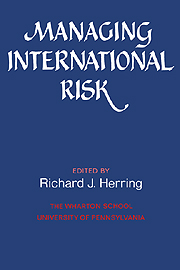 Managing International Risk
Managing International Risk Book contents
- Frontmatter
- Contents
- List of contributors
- Acknowledgments
- Introduction and overview
- 1 Managing risks to the international economic system
- Perspective: Political threats to the international economic system
- Perspective: The crisis of exogeneity, or our reduced ability to deal with risk
- 2 Country risk: economic aspects
- 3 Political risk: analysis, process, and purpose
- 4 Country risk: social and cultural aspects
- Perspective: The risks of lending to developing countries
- Perspective: Country risk, a banker's view
- Perspective: Managing country risk for a manufacturing corporation
- 5 Organizational and institutional responses to international risk
- Perspective: Organizational strategies for coping with country risk
- 6 Insuring against country risks: descriptive and prescriptive aspects
- Perspective: Country risk insurance, an insurer's view
- Index
1 - Managing risks to the international economic system
Published online by Cambridge University Press: 07 May 2010
- Frontmatter
- Contents
- List of contributors
- Acknowledgments
- Introduction and overview
- 1 Managing risks to the international economic system
- Perspective: Political threats to the international economic system
- Perspective: The crisis of exogeneity, or our reduced ability to deal with risk
- 2 Country risk: economic aspects
- 3 Political risk: analysis, process, and purpose
- 4 Country risk: social and cultural aspects
- Perspective: The risks of lending to developing countries
- Perspective: Country risk, a banker's view
- Perspective: Managing country risk for a manufacturing corporation
- 5 Organizational and institutional responses to international risk
- Perspective: Organizational strategies for coping with country risk
- 6 Insuring against country risks: descriptive and prescriptive aspects
- Perspective: Country risk insurance, an insurer's view
- Index
Summary
Introduction: clarifying terms
We live in a period of high uncertainty, some would say exceptional uncertainty. John Kenneth Galbraith has called it the “Age of Uncertainty.” The purpose of this chapter is to assess the risks, or one might better say, the threats, to the international economic system that arise from this uncertainty, and the suitability of present institutional arrangements to deal with those risks.
By “risk” I mean the possibility of an unforeseen development that influences our welfare. Risk as used here bears little relationship to the risk involved in games of chance, where the outcome is uncertain before the dice are rolled, but the nature of the outcomes is understood and their relative likelihood, or probability, is known. One might say there is statistical certainty in games of chance. In sharp contrast, the principal effort to deal with risk in social systems, as with hang gliding, is to try to influence the probabilities.
If the development is foreseen, it can be allowed for and is not a risk. For the most part, we will be dealing with unforeseen adverse developments. Favorable developments are generally of less concern, although in some cases, if they are mishandled, they may influence the future adversely, as when a firm finds itself with demand for its products that it cannot satisfy and thereby loses customers, or a country discovers oil, which creates public expectations it cannot satisfy.
- Type
- Chapter
- Information
- Managing International RiskEssays Commissioned in Honor of the Centenary of the Wharton School, University of Pennsylvania, pp. 23 - 53Publisher: Cambridge University PressPrint publication year: 1983


